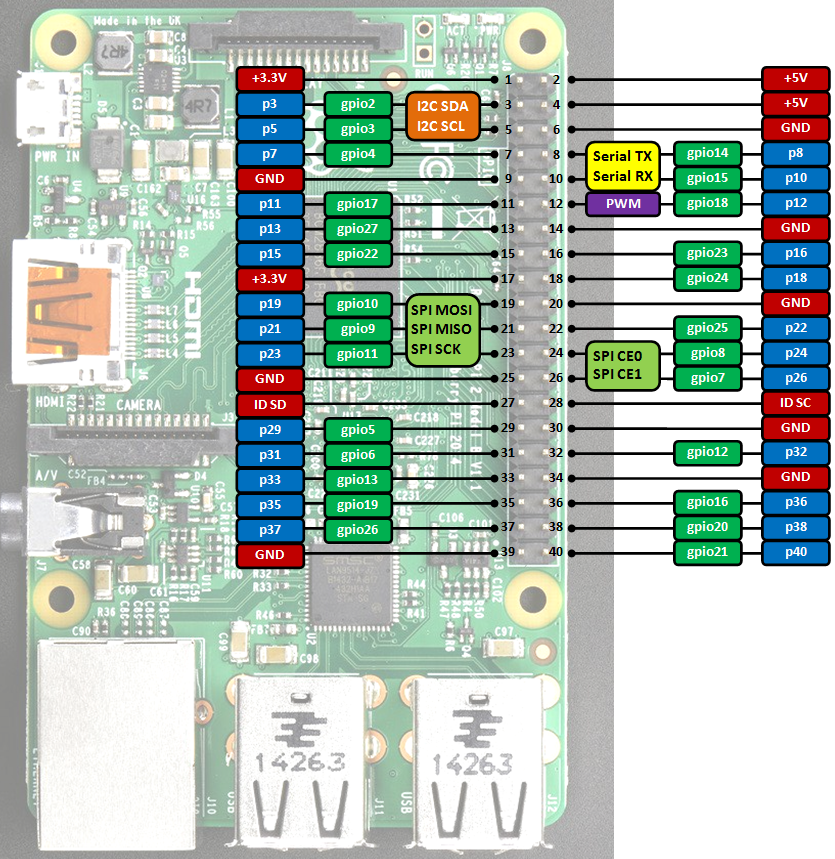mbed API for Raspberry Pi boards.
mbedPi
This is an attempt to implement a limited number of mbed APIs for Raspberry Pi single-board computers. The project was inspired by and based on the arduPi library developed for the Arduino by Cooking Hacks .
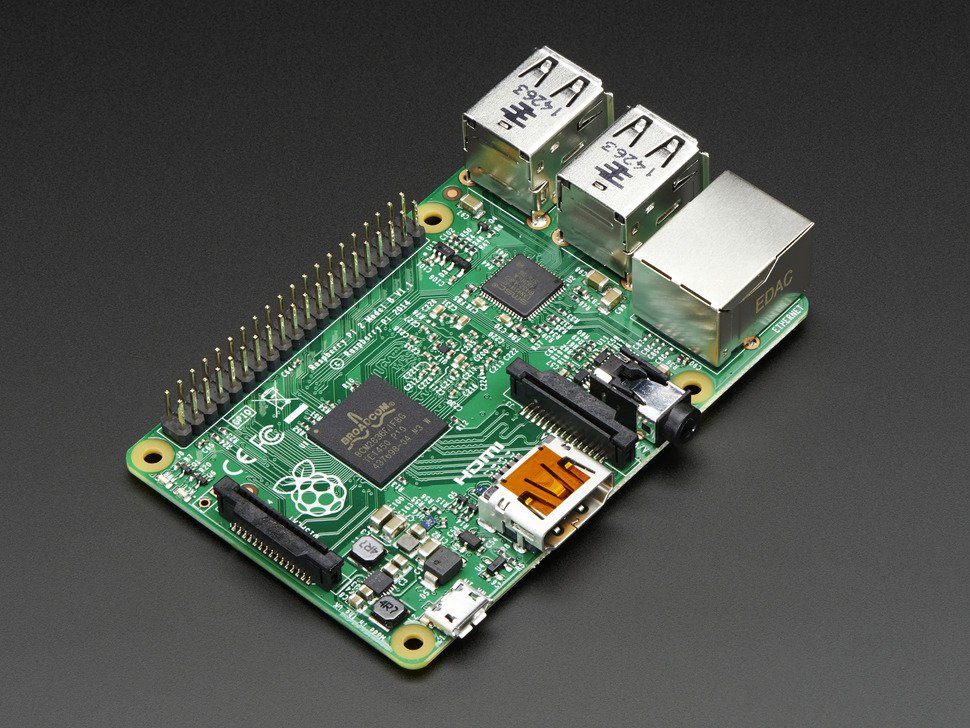
Specifications
- Chip: Broadcom BCM2836 SoC
- Core architecture: Quad-core ARM Cortex-A7
- CPU frequency: 900 MHz
- GPU: Dual Core VideoCore IV® Multimedia Co-Processor
- Memory: 1GB LPDDR2
- Operating System: Boots from Micro SD card, running a version of the Linux operating system
- Power: Micro USB socket 5V, 2A
Connectors
- Ethernet: 10/100 BaseT Ethernet socket
- Video Output: HDMI (rev 1.3 & 1.4)
- Audio Output: 3.5mm jack, HDMI
- USB: 4 x USB 2.0 Connector
- GPIO Connector: 40-pin 2.54 mm (100 mil) expansion header: 2x20 strip providing 27 GPIO pins as well as +3.3 V, +5 V and GND supply lines
- Camera Connector: 15-pin MIPI Camera Serial Interface (CSI-2)
- JTAG: Not populated
- Display Connector: Display Serial Interface (DSI) 15 way flat flex cable connector with two data lanes and a clock lane
- Memory Card Slot: Micro SDIO
GPIO connector pinout
Information
Only the labels printed in blue/white or green/white (i.e. p3, gpio2 ...) must be used in your code. The other labels are given as information (alternate-functions, power pins, ...).
Building programs for the Raspberry Pi with mbedPi
I use Qt Creator for development, however you can use any other IDE available on the Raspberry Pi (e.g. Geany) if you like. For a quick try:
- Install Qt and the Qt Creator onto your Raspberry Pi. Then create a new "Blinky" Plain non-Qt C++ Project as follows:
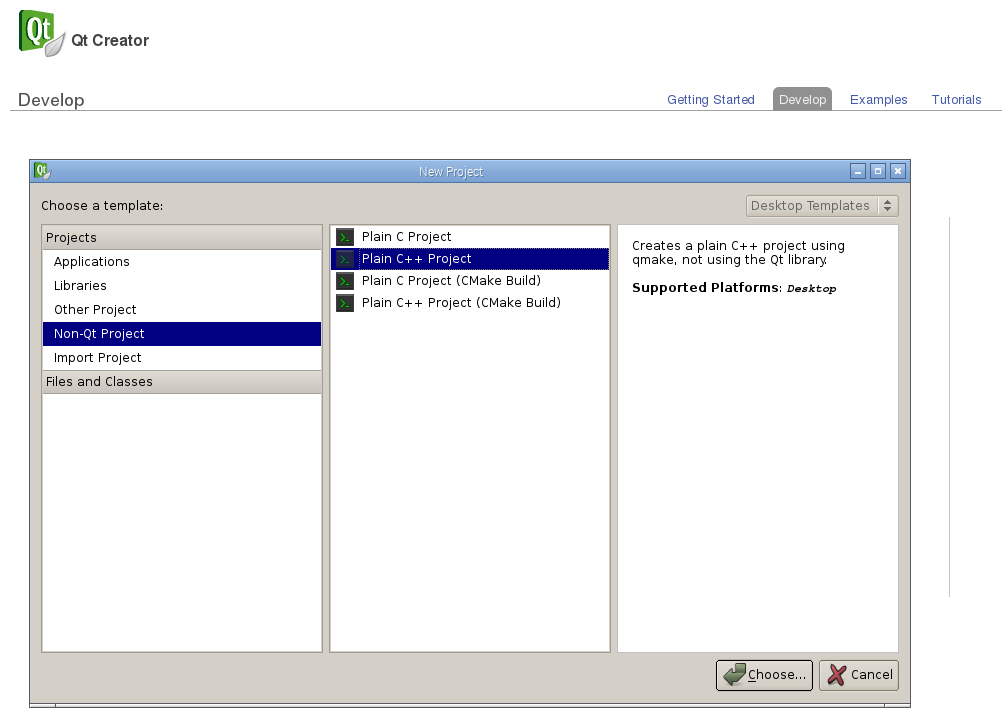
- Change the main code as below:
main.cpp
#include "mbedPi.h"
int main()
{
DigitalOut myled(p7);
while(1) {
myled = 1; // LED is ON
wait(0.2); // 200 ms
myled = 0; // LED is OFF
wait(1.0); // 1 sec
printf("Blink\r\n");
}
}
- Copy the mbedPi.zip file into your project's folder and unzip.
- Add the mbedPi.h and mbedPi.cpp files to your project by right clicking on the "Blinky" project and then clicking on the "Add Existing Files..." option in the local menu:
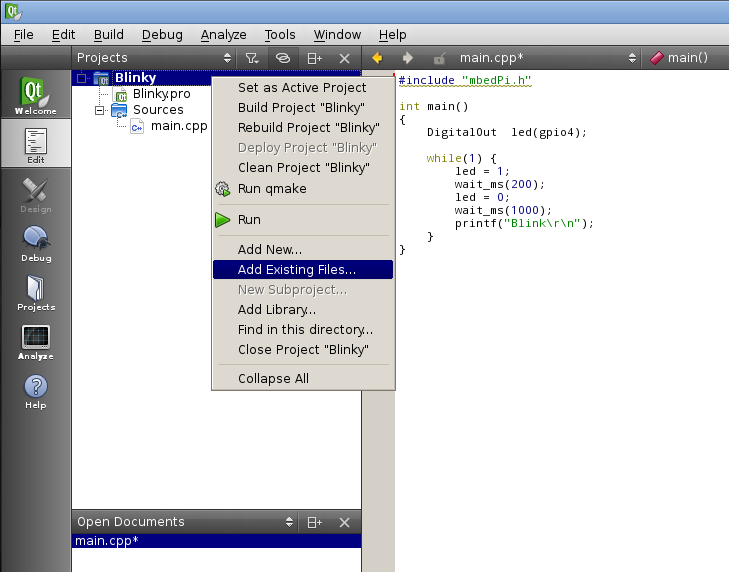
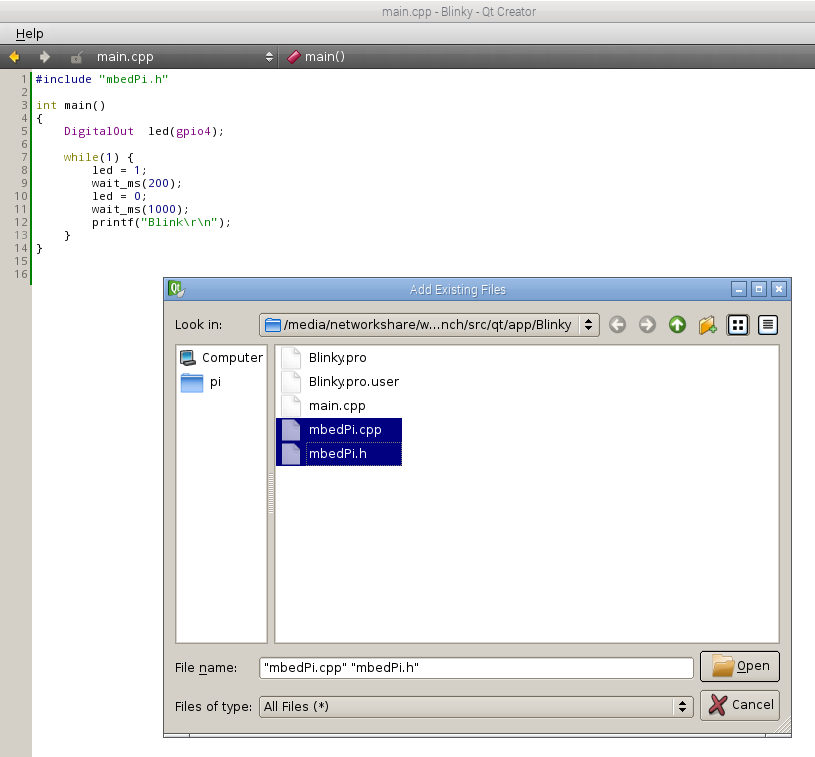
- Double click on Blinky.pro to open it for editing and add new libraries by inserting a new line as follows:
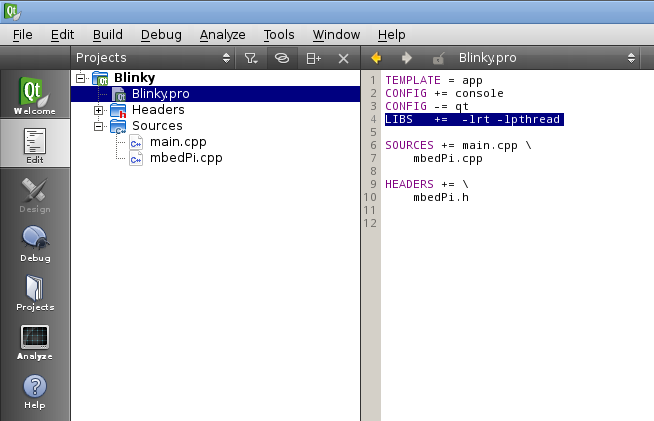
- Compile the project.
- Connect an LED through a 1k resistor to pin 7 and the ground on the Raspberry Pi GPIO connector.
- Run the binary as sudo (sudo ./Blinky) and you should see the LED blinking.

- Press Ctrl+c to stop running the application.
mbedPi.h
- Committer:
- hudakz
- Date:
- 2016-10-18
- Revision:
- 0:91392e1f8551
File content as of revision 0:91392e1f8551:
/*
* Copyright (C) 2016 Zoltan Hudak
* hudakz@outlook.com
*
* Portions Copyright (C) Libelium Comunicaciones Distribuidas S.L.
* http://www.libelium.com
*
* This program is free software: you can redistribute it and/or modify
* it under the terms of the GNU General Public License as published by
* the Free Software Foundation, either version 3 of the License, or
* (at your option) any later version.
*
* This program is distributed in the hope that it will be useful,
* but WITHOUT ANY WARRANTY; without even the implied warranty of
* MERCHANTABILITY or FITNESS FOR A PARTICULAR PURPOSE. See the
* GNU General Public License for more details.
*
* You should have received a copy of the GNU General Public License
* along with this program. If not, see <http://www.gnu.org/licenses/>.
*
* Version 1.0
*/
//
/*$off*/
#ifndef MBEDPI_H
#define MBEDPI_H
#include <errno.h>
#include <fcntl.h>
#include <netinet/in.h>
#include <signal.h>
#include <stdlib.h>
#include <stdio.h>
#include <sys/ipc.h>
#include <sys/sem.h>
#include <sys/socket.h>
#include <sys/time.h>
#include <sys/types.h>
#include <sys/wait.h>
#include <sys/mman.h>
#include <string.h>
#include <time.h>
#include <termios.h>
#include <ctype.h>
#include <sys/ioctl.h>
#include <limits.h>
#include <algorithm>
#include <limits.h>
#include <pthread.h>
#include <poll.h>
#define IOBASE 0x20000000
#define GPIO_BASE (IOBASE + 0x200000)
#define BCM2835_SPI0_BASE (IOBASE + 0x204000)
#define BCM2835_BSC1_BASE (IOBASE + 0x804000)
// Defines for I2C
// GPIO register offsets from BCM2835_BSC*_BASE.
// Offsets into the BSC Peripheral block in bytes per 3.1 BSC Register Map
#define BCM2835_BSC_C 0x0000 ///< BSC Master Control
#define BCM2835_BSC_S 0x0004 ///< BSC Master Status
#define BCM2835_BSC_DLEN 0x0008 ///< BSC Master Data Length
#define BCM2835_BSC_A 0x000c ///< BSC Master Slave Address
#define BCM2835_BSC_FIFO 0x0010 ///< BSC Master Data FIFO
#define BCM2835_BSC_DIV 0x0014 ///< BSC Master Clock Divider
#define BCM2835_BSC_DEL 0x0018 ///< BSC Master Data Delay
#define BCM2835_BSC_CLKT 0x001c ///< BSC Master Clock Stretch Timeout
// Register masks for BSC_C
#define BCM2835_BSC_C_I2CEN 0x00008000 ///< I2C Enable, 0 = disabled, 1 = enabled
#define BCM2835_BSC_C_INTR 0x00000400 ///< Interrupt on RX
#define BCM2835_BSC_C_INTT 0x00000200 ///< Interrupt on TX
#define BCM2835_BSC_C_INTD 0x00000100 ///< Interrupt on DONE
#define BCM2835_BSC_C_ST 0x00000080 ///< Start transfer, 1 = Start a new transfer
#define BCM2835_BSC_C_CLEAR_1 0x00000020 ///< Clear FIFO Clear
#define BCM2835_BSC_C_CLEAR_2 0x00000010 ///< Clear FIFO Clear
#define BCM2835_BSC_C_READ 0x00000001 ///< Read transfer
// Register masks for BSC_S
#define BCM2835_BSC_S_CLKT 0x00000200 ///< Clock stretch timeout
#define BCM2835_BSC_S_ERR 0x00000100 ///< ACK error
#define BCM2835_BSC_S_RXF 0x00000080 ///< RXF FIFO full, 0 = FIFO is not full, 1 = FIFO is full
#define BCM2835_BSC_S_TXE 0x00000040 ///< TXE FIFO full, 0 = FIFO is not full, 1 = FIFO is full
#define BCM2835_BSC_S_RXD 0x00000020 ///< RXD FIFO contains data
#define BCM2835_BSC_S_TXD 0x00000010 ///< TXD FIFO can accept data
#define BCM2835_BSC_S_RXR 0x00000008 ///< RXR FIFO needs reading (full)
#define BCM2835_BSC_S_TXW 0x00000004 ///< TXW FIFO needs writing (full)
#define BCM2835_BSC_S_DONE 0x00000002 ///< Transfer DONE
#define BCM2835_BSC_S_TA 0x00000001 ///< Transfer Active
#define BCM2835_BSC_FIFO_SIZE 16 ///< BSC FIFO size
#define BCM2835_CORE_CLK_HZ 250000000 ///< 250 MHz
/// \brief bcm2835I2CClockDivider
/// Specifies the divider used to generate the I2C clock from the system clock.
/// Clock divided is based on nominal base clock rate of 250MHz
typedef enum
{
BCM2835_I2C_CLOCK_DIVIDER_2500 = 2500, ///< 2500 = 10us = 100 kHz
BCM2835_I2C_CLOCK_DIVIDER_626 = 626, ///< 622 = 2.504us = 399.3610 kHz
BCM2835_I2C_CLOCK_DIVIDER_150 = 150, ///< 150 = 60ns = 1.666 MHz (default at reset)
BCM2835_I2C_CLOCK_DIVIDER_148 = 148, ///< 148 = 59ns = 1.689 MHz
} bcm2835I2CClockDivider;
/// \brief bcm2835I2CReasonCodes
/// Specifies the reason codes for the bcm2835_i2c_write and bcm2835_i2c_read functions.
typedef enum
{
BCM2835_I2C_REASON_OK = 0x00, ///< Success
BCM2835_I2C_REASON_ERROR_NACK = 0x01, ///< Received a NACK
BCM2835_I2C_REASON_ERROR_CLKT = 0x02, ///< Received Clock Stretch Timeout
BCM2835_I2C_REASON_ERROR_DATA = 0x04, ///< Not all data is sent / received
} bcm2835I2CReasonCodes;
typedef enum
{
RPI_V2_GPIO_P1_03 = 2, ///< Version 2, Pin P1-03
RPI_V2_GPIO_P1_05 = 3, ///< Version 2, Pin P1-05
} RPiGPIOPin;
#define BSC0_C *(bsc0.addr + 0x00)
#define BSC0_S *(bsc0.addr + 0x01)
#define BSC0_DLEN *(bsc0.addr + 0x02)
#define BSC0_A *(bsc0.addr + 0x03)
#define BSC0_FIFO *(bsc0.addr + 0x04)
#define BSC_C_I2CEN (1<< 15)
#define BSC_C_INTR (1<< 10)
#define BSC_C_INTT (1<< 9)
#define BSC_C_INTD (1<< 8)
#define BSC_C_ST (1<< 7)
#define BSC_C_CLEAR (1<< 4)
#define BSC_C_READ 1
#define START_READ BSC_C_I2CEN|BSC_C_ST|BSC_C_CLEAR|BSC_C_READ
#define START_WRITE BSC_C_I2CEN|BSC_C_ST
#define BSC_S_CLKT (1<< 9)
#define BSC_S_ERR (1<< 8)
#define BSC_S_RXF (1<< 7)
#define BSC_S_TXE (1<< 6)
#define BSC_S_RXD (1<< 5)
#define BSC_S_TXD (1<< 4)
#define BSC_S_RXR (1<< 3)
#define BSC_S_TXW (1<< 2)
#define BSC_S_DONE (1<< 1)
#define BSC_S_TA 1
#define CLEAR_STATUS BSC_S_CLKT|BSC_S_ERR|BSC_S_DONE
#define GPFSEL0 *(gpio.addr + 0)
#define GPFSEL1 *(gpio.addr + 1)
#define GPFSEL2 *(gpio.addr + 2)
#define GPFSEL3 *(gpio.addr + 3)
#define GPFSEL4 *(gpio.addr + 4)
#define GPFSEL5 *(gpio.addr + 5)
// Reserved @ word offset 6
#define GPSET0 *(gpio.addr + 7)
#define GPSET1 *(gpio.addr + 8)
// Reserved @ word offset 9
#define GPCLR0 *(gpio.addr + 10)
#define GPCLR1 *(gpio.addr + 11)
// Reserved @ word offset 12
#define GPLEV0 *(gpio.addr + 13)
#define GPLEV1 *(gpio.addr + 14)
#define PAGESIZE 4096
#define BLOCK_SIZE 4096
/// Defines for SPI
/// GPIO register offsets from BCM2835_SPI0_BASE.
/// Offsets into the SPI Peripheral block in bytes per 10.5 SPI Register Map
#define BCM2835_SPI0_CS 0x0000 ///< SPI Master Control and Status
#define BCM2835_SPI0_FIFO 0x0004 ///< SPI Master TX and RX FIFOs
#define BCM2835_SPI0_CLK 0x0008 ///< SPI Master Clock Divider
#define BCM2835_SPI0_DLEN 0x000c ///< SPI Master Data Length
#define BCM2835_SPI0_LTOH 0x0010 ///< SPI LOSSI mode TOH
#define BCM2835_SPI0_DC 0x0014 ///< SPI DMA DREQ Controls
// Register masks for SPI0_CS
#define BCM2835_SPI0_CS_LEN_LONG 0x02000000 ///< Enable Long data word in Lossi mode if DMA_LEN is set
#define BCM2835_SPI0_CS_DMA_LEN 0x01000000 ///< Enable DMA mode in Lossi mode
#define BCM2835_SPI0_CS_CSPOL2 0x00800000 ///< Chip Select 2 Polarity
#define BCM2835_SPI0_CS_CSPOL1 0x00400000 ///< Chip Select 1 Polarity
#define BCM2835_SPI0_CS_CSPOL0 0x00200000 ///< Chip Select 0 Polarity
#define BCM2835_SPI0_CS_RXF 0x00100000 ///< RXF - RX FIFO Full
#define BCM2835_SPI0_CS_RXR 0x00080000 ///< RXR RX FIFO needs Reading ( full)
#define BCM2835_SPI0_CS_TXD 0x00040000 ///< TXD TX FIFO can accept Data
#define BCM2835_SPI0_CS_RXD 0x00020000 ///< RXD RX FIFO contains Data
#define BCM2835_SPI0_CS_DONE 0x00010000 ///< Done transfer Done
#define BCM2835_SPI0_CS_TE_EN 0x00008000 ///< Unused
#define BCM2835_SPI0_CS_LMONO 0x00004000 ///< Unused
#define BCM2835_SPI0_CS_LEN 0x00002000 ///< LEN LoSSI enable
#define BCM2835_SPI0_CS_REN 0x00001000 ///< REN Read Enable
#define BCM2835_SPI0_CS_ADCS 0x00000800 ///< ADCS Automatically Deassert Chip Select
#define BCM2835_SPI0_CS_INTR 0x00000400 ///< INTR Interrupt on RXR
#define BCM2835_SPI0_CS_INTD 0x00000200 ///< INTD Interrupt on Done
#define BCM2835_SPI0_CS_DMAEN 0x00000100 ///< DMAEN DMA Enable
#define BCM2835_SPI0_CS_TA 0x00000080 ///< Transfer Active
#define BCM2835_SPI0_CS_CSPOL 0x00000040 ///< Chip Select Polarity
#define BCM2835_SPI0_CS_CLEAR 0x00000030 ///< Clear FIFO Clear RX and TX
#define BCM2835_SPI0_CS_CLEAR_RX 0x00000020 ///< Clear FIFO Clear RX
#define BCM2835_SPI0_CS_CLEAR_TX 0x00000010 ///< Clear FIFO Clear TX
#define BCM2835_SPI0_CS_CPOL 0x00000008 ///< Clock Polarity
#define BCM2835_SPI0_CS_CPHA 0x00000004 ///< Clock Phase
#define BCM2835_SPI0_CS_CS 0x00000003 ///< Chip Select
#define BCM2835_GPFSEL0 0x0000 ///< GPIO Function Select 0
#define BCM2835_GPEDS0 0x0040 ///< GPIO Pin Event Detect Status 0
#define BCM2835_GPREN0 0x004c ///< GPIO Pin Rising Edge Detect Enable 0
#define BCM2835_GPFEN0 0x0048 ///< GPIO Pin Falling Edge Detect Enable 0
#define BCM2835_GPHEN0 0x0064 ///< GPIO Pin High Detect Enable 0
#define BCM2835_GPLEN0 0x0070 ///< GPIO Pin Low Detect Enable 0
static int REV = 0;
typedef enum {
// Not connected
NC = (int)0xFFFFFFFF,
// GPIO names
gpio2 = 2,
gpio3 = 3,
gpio4 = 4,
gpio5 = 5,
gpio6 = 6,
gpio7 = 7,
gpio8 = 8,
gpio9 = 9,
gpio10 = 10,
gpio11 = 11,
gpio12 = 12,
gpio13 = 13,
gpio14 = 14,
gpio15 = 15,
gpio16 = 16,
gpio17 = 17,
gpio18 = 18,
gpio19 = 19,
gpio20 = 20,
gpio21 = 21,
gpio22 = 22,
gpio23 = 23,
gpio24 = 24,
gpio25 = 25,
gpio26 = 26,
gpio27 = 27,
// Rapsberry Pi pin names
p3 = gpio2,
p5 = gpio3,
p7 = gpio4,
p8 = gpio14,
p10 = gpio15,
p11 = gpio17,
p12 = gpio18,
p13 = gpio27,
p15 = gpio22,
p16 = gpio23,
p18 = gpio24,
p19 = gpio10,
p21 = gpio9,
p22 = gpio25,
p23 = gpio11,
p24 = gpio8,
p26 = gpio7,
p29 = gpio5,
p31 = gpio6,
p32 = gpio12,
p33 = gpio13,
p35 = gpio19,
p36 = gpio16,
p37 = gpio26,
p38 = gpio20,
p40 = gpio21,
// Extension board V2.1 pin names
P0 = gpio17,
P1 = gpio18,
P2 = gpio27,
P3 = gpio22,
P4 = gpio23,
P5 = gpio24,
P6 = gpio25,
P7 = gpio4,
CE1 = gpio7,
CE0 = gpio8,
CS = gpio8,
SCLK = gpio11,
MISO = gpio9,
MOSI = gpio10,
RXD = gpio15,
TXD = gpio14,
SCL = gpio3,
SDA = gpio2,
PWM = gpio18
} PinName;
typedef enum
{
PIN_INPUT,
PIN_OUTPUT
} PinDirection;
typedef enum
{
PullNone,
PullUp,
PullDown,
OpenDrain,
PullDefault = PullNone
} PinMode;
typedef void (*FunctionPointer) (void);
/// \brief bcm2835SPIBitOrder
/// Specifies the SPI data bit ordering
typedef enum
{
LSBFIRST = 0, ///< LSB First
MSBFIRST = 1///< MSB First
}bcm2835SPIBitOrder;
/// \brief bcm2835SPIMode
/// Specify the SPI data mode
typedef enum
{
SPI_MODE0 = 0, ///< CPOL = 0, CPHA = 0
SPI_MODE1 = 1, ///< CPOL = 0, CPHA = 1
SPI_MODE2 = 2, ///< CPOL = 1, CPHA = 0
SPI_MODE3 = 3, ///< CPOL = 1, CPHA = 1
}bcm2835SPIMode;
/// \brief bcm2835SPIChipSelect
/// Specify the SPI chip select pin(s)
typedef enum
{
SPI_CS0 = 0, ///< Chip Select 0
SPI_CS1 = 1, ///< Chip Select 1
SPI_CS2 = 2, ///< Chip Select 2 (ie pins CS1 and CS2 are asserted)
SPI_CS_NONE = 3, ///< No CS, control it yourself
} bcm2835SPIChipSelect;
/// \brief bcm2835SPIClockDivider
/// Specifies the divider used to generate the SPI clock from the system clock.
/// Figures below give the divider, clock period and clock frequency.
typedef enum
{
SPI_CLOCK_DIV65536 = 0, ///< 65536 = 256us = 4kHz
SPI_CLOCK_DIV32768 = 32768, ///< 32768 = 126us = 8kHz
SPI_CLOCK_DIV16384 = 16384, ///< 16384 = 64us = 15.625kHz
SPI_CLOCK_DIV8192 = 8192, ///< 8192 = 32us = 31.25kHz
SPI_CLOCK_DIV4096 = 4096, ///< 4096 = 16us = 62.5kHz
SPI_CLOCK_DIV2048 = 2048, ///< 2048 = 8us = 125kHz
SPI_CLOCK_DIV1024 = 1024, ///< 1024 = 4us = 250kHz
SPI_CLOCK_DIV512 = 512, ///< 512 = 2us = 500kHz
SPI_CLOCK_DIV256 = 256, ///< 256 = 1us = 1MHz
SPI_CLOCK_DIV128 = 128, ///< 128 = 500ns = = 2MHz
SPI_CLOCK_DIV64 = 64, ///< 64 = 250ns = 4MHz
SPI_CLOCK_DIV32 = 32, ///< 32 = 125ns = 8MHz
SPI_CLOCK_DIV16 = 16, ///< 16 = 50ns = 20MHz
SPI_CLOCK_DIV8 = 8, ///< 8 = 25ns = 40MHz
SPI_CLOCK_DIV4 = 4, ///< 4 = 12.5ns 80MHz
SPI_CLOCK_DIV2 = 2, ///< 2 = 6.25ns = 160MHz
SPI_CLOCK_DIV1 = 1, ///< 0 = 256us = 4kHz
} bcm2835SPIClockDivider;
typedef enum
{
BCM2835_GPIO_FSEL_INPT = 0b000, ///< Input
BCM2835_GPIO_FSEL_OUTP = 0b001, ///< Output
BCM2835_GPIO_FSEL_ALT0 = 0b100, ///< Alternate function 0
BCM2835_GPIO_FSEL_ALT1 = 0b101, ///< Alternate function 1
BCM2835_GPIO_FSEL_ALT2 = 0b110, ///< Alternate function 2
BCM2835_GPIO_FSEL_ALT3 = 0b111, ///< Alternate function 3
BCM2835_GPIO_FSEL_ALT4 = 0b011, ///< Alternate function 4
BCM2835_GPIO_FSEL_ALT5 = 0b010, ///< Alternate function 5
BCM2835_GPIO_FSEL_MASK = 0b111 ///< Function select bits mask
} bcm2835FunctionSelect;
namespace unistd {
//All functions of unistd.h must be called like this: unistd::the_function()
#include <unistd.h>
}
enum Representation{
BIN,
OCT,
DEC,
HEX,
BYTE
};
typedef enum {
LOW = 0,
HIGH = 1,
RISING = 2,
FALLING = 3,
BOTH = 4
} Digivalue;
//
/*$on*/
//
typedef bool boolean;
typedef unsigned char byte;
struct bcm2835_peripheral
{
unsigned long addr_p;
int mem_fd;
void* map;
volatile unsigned int* addr;
};
struct ThreadArg
{
void (*func) ();
int pin;
};
void wait(float s);
void wait_ms(int ms);
void wait_us(int us);
void gpio_dir(PinName pin, PinDirection direction);
void gpio_mode(PinName pin, PinMode mode);
void gpio_write(PinName pin, int value);
int gpio_read(PinName pin);
uint8_t shiftIn(PinName dPin, PinName cPin, bcm2835SPIBitOrder order);
void shiftOut(PinName dPin, PinName cPin, bcm2835SPIBitOrder order, uint8_t val);
void attachInterrupt(PinName p, void (*f) (), Digivalue m);
void detachInterrupt(PinName p);
class DigitalIn
{
public:
DigitalIn(PinName pin) : gpio(pin) { gpio_dir(gpio, PIN_INPUT); gpio_write(gpio, LOW); }
DigitalIn(PinName pin, PinMode mode) : gpio(pin) { gpio_dir(gpio, PIN_INPUT); gpio_mode(pin, mode); }
int read(void) { return gpio_read(gpio); }
void mode(PinMode mode) { mode == PullUp ? gpio_write(gpio, HIGH) : gpio_write(gpio, LOW); }
void attach(FunctionPointer fptr, Digivalue m) { attachInterrupt(gpio, fptr, m); }
operator int(void) { return read(); }
protected:
PinName gpio;
};
class DigitalOut
{
public:
DigitalOut(PinName pin) : gpio(pin) { gpio_dir(gpio, PIN_OUTPUT); }
DigitalOut(PinName pin, int value) : gpio(pin) { gpio_dir(gpio, PIN_OUTPUT); gpio_write(gpio, value); }
void write(int value) { gpio_write(gpio, value); }
int read(void) { return gpio_read(gpio); }
DigitalOut &operator =(int value) { write(value); return *this; }
DigitalOut &operator =(DigitalOut& rhs) { write(rhs.read()); return *this; }
operator int(void) { return read(); }
protected:
PinName gpio;
};
class DigitalInOut
{
public:
DigitalInOut(PinName pin) : gpio(pin) { PinMode(PIN_INPUT); }
DigitalInOut(PinName pin, PinDirection direction, PinMode mode, int value) :
gpio(pin) {
if(direction == PIN_INPUT) {
gpio_dir(gpio, PIN_INPUT);
if(mode == PullUp)
gpio_write(gpio, HIGH);
else
gpio_write(gpio, LOW);
}
else {
gpio_dir(gpio, PIN_OUTPUT);
gpio_write(gpio, value);
}
}
void write(int value) { gpio_write(gpio, value); }
int read(void) { return gpio_read(gpio); }
void output(void) { gpio_dir(gpio, PIN_OUTPUT); }
void input(void) { gpio_dir(gpio, PIN_INPUT); }
DigitalInOut &operator =(int value) { write(value); return *this; }
operator int(void) { return read(); }
protected:
PinName gpio;
};
class InterruptIn
{
public:
InterruptIn(PinName pin) :
_digitalIn(pin) { }
void rise(FunctionPointer fptr) { _digitalIn.attach(fptr, RISING); }
void fall(FunctionPointer fptr) { _digitalIn.attach(fptr, FALLING); }
void both(FunctionPointer fptr) { _digitalIn.attach(fptr, BOTH); }
int read(void) { return _digitalIn.read(); }
void mode(PinMode mode) { _digitalIn.mode(mode); }
operator int(void) { return _digitalIn.read(); }
protected:
DigitalIn _digitalIn;
};
class Serial
{
private:
int sd, status;
const char* serialPort;
unsigned char c;
struct termios options;
int speed;
long timeOut;
timespec time1, time2;
timespec timeDiff(timespec start, timespec close);
char* int2bin(int i);
char* int2hex(int i);
char* int2oct(int i);
public:
Serial(void);
void baud(int serialSpeed);
int readable(void);
char read(void);
int readBytes(char message[], int size);
int readBytesUntil(char character, char buffer[], int length);
bool find(const char* target);
bool findUntil(const char* target, const char* terminal);
long parseInt(void);
float parseFloat(void);
char peek(void);
void printf(const char* format, ...);
int write(uint8_t message);
int write(const char* message);
int write(char* message, int size);
void flush(void);
void setTimeout(long millis);
void close(void);
};
class I2C
{
private:
int i2c_byte_wait_us;
int i2c_bytes_to_read;
void dump_bsc_status(void);
void wait_i2c_done(void);
public:
I2C(void);
void begin(void);
void beginTransmission(unsigned char address);
void write(char data);
uint8_t write(const char* buf, uint32_t len);
void endTransmission(void);
void requestFrom(unsigned char address, int quantity);
unsigned char read(void);
uint8_t read(char* buf);
uint8_t read_rs(char* regaddr, char* buf, uint32_t len);
};
class SPI
{
public:
SPI(void);
void begin(void);
void end(void);
void setBitOrder(uint8_t order);
void setClockDivider(uint16_t divider);
void setDataMode(uint8_t mode);
void chipSelect(uint8_t cs);
void setChipSelectPolarity(uint8_t cs, uint8_t active);
uint8_t transfer(uint8_t value);
void transfernb(char* tbuf, char* rbuf, uint32_t len);
};
class Peripheral
{
private:
int memfd;
int map_peripheral(struct bcm2835_peripheral* p);
void unmap_peripheral(struct bcm2835_peripheral* p);
public:
Peripheral(void);
~Peripheral(void);
};
/* Helper functions */
int getBoardRev(void);
uint32_t* mapmem(const char* msg, size_t size, int fd, off_t off);
void setBoardRev(int rev);
pthread_t* getThreadIdFromPin(int pin);
void* threadFunction(void* args);
uint32_t bcm2835_peri_read(volatile uint32_t* paddr);
uint32_t bcm2835_peri_read_nb(volatile uint32_t* paddr);
void bcm2835_peri_write(volatile uint32_t* paddr, uint32_t value);
void bcm2835_peri_write_nb(volatile uint32_t* paddr, uint32_t value);
void bcm2835_peri_set_bits(volatile uint32_t* paddr, uint32_t value, uint32_t mask);
void bcm2835_gpio_fsel(uint8_t pin, uint8_t mode);
#endif // MBEDPI_H
